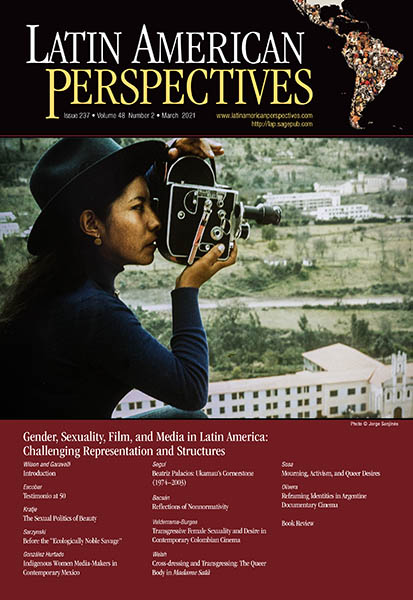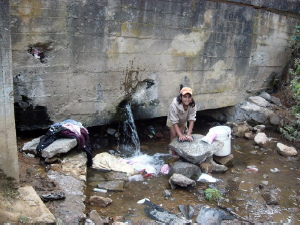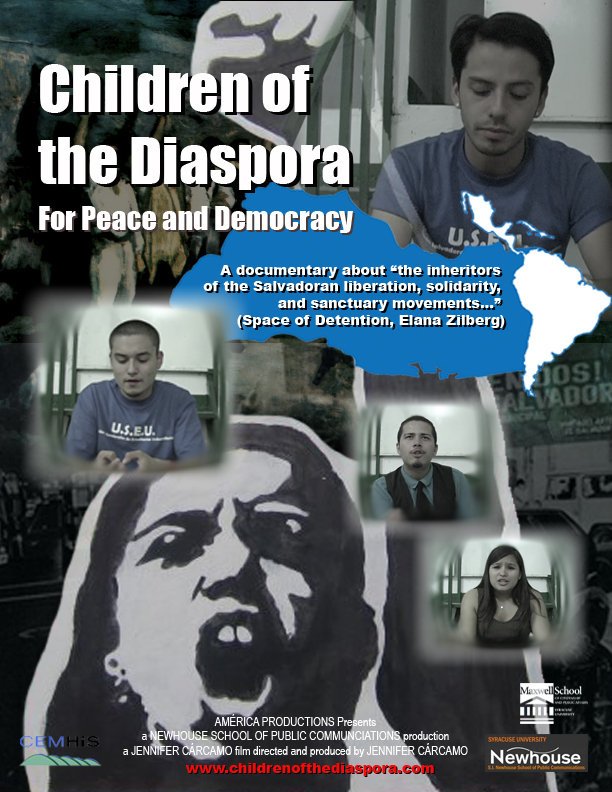 By: Kristi M. Wilson
By: Kristi M. Wilson
According to Avery Gordon, sociological hauntings can take a range of forms, from lost personal artifacts to decaying archival material to people living in the wake of dispossession and repression. Two Brazilian films from 2012, Neighboring Sounds/O som ao redor, a fiction film directed by Kleber Mendonça Filho, and Elena, a documentary directed by Petra Costa, explore this idea of hauntings from different moments of the political past: colonialism and the last dictatorship, respectively. They represent collisions between the force of the past and its meaning in the present across a range of Brazilian chronoscapes—historical changes and recurrences that impact race, gender, and class relations and speak to the widening chasm of social inequality, continually reinventing itself for the times. Neighboring Sounds was featured at the 2013 Latin American Studies Association film festival.
Neighboring Sounds explores notions of past and present violence under the surface of the increasingly privatized and policed urban landscape of Recife, a Portuguese colonial settlement with a painful history of slavery and sugar barons. Elena is a poetic documentary about loss, memory, and exile (from home and self). Born at the tail end of the dictatorship to Marxist activists in hiding, Costa uses her personal archive of diaries, home videos, and voice recordings to conjure up the painful memory of her sister’s suicide in New York.
Neighboring Sounds starts with a black screen and a series of ambient sounds (cars, birds, wind, steps) followed by old black-and-white archival photos of a sugar plantation. The series of old photos of schoolchildren and agricultural workers gives way to a contemporary urban scene in which a plump boy rides a bike in an upscale high-rise apartment parking structure, followed by a girl on Rollerblades. Photographic images of children on the plantation are replaced by a present-day group of kids with their nannies in a rooftop playground. The piercing sound of metal being soldered by a worker across the street captures the attention of some of the children. In another scene a woman in an apartment is unable to sleep because of her neighbor’s barking dog. She wraps some pills in a piece of meat and tosses it out the window to the dog. The film’s protagonists consist of a loosely knit wealthy family (whose patriarch, Seu Francisco, owns half of the town’s property), neighbors, and a group of security guards. Seu Francisco’s wealth comes from the sugar plantation depicted at the start of the film and stays in his extended family in the form of high-rise buildings popping up in Recife.
João, heir apparent to Francisco’s fortune, is a young man just back from seven years in Germany. The most sympathetic member of the family, he hates his job as a high-end property manager (renting apartments that feature a state-of-the-art security system). His affection grows for a young woman named Sofia who grew up in a house owned by Seu Francisco. Clodoaldo Pereira dos Anjos, a mysterious security guard, parallels João as a sinister lead character. He and his ragtag band of private security guards appear to have emerged from nowhere at just the right time to help cleanse Recife of its petty crime problem by offering street protection and “guaranteed peace of mind.” Clodoaldo will look after the street in exchange for a small “collaboration fee” and the keys to homes and apartments. He takes full advantage of his position to use the apartments for sexual encounters with domestic workers when the owners are away; such acts evoke the worst nightmares of middle-class urbanites by demonstrating the porous borders between classes.
Neighboring Sounds chronicles the growing political emphasis in many Latin American cities on crime, insecurity, and increasing social inequality, fueled in part by inheritance transfers of wealth from one generation to the next. Rich and poor classes live side by side in many Latin American cities as traditional, humble homes are torn down and replaced by high-rises. One sees rapid urban expansion on a massive scale in cities from Buenos Aires to Lima to Mexico City. By setting the film in the smaller, humbler city of Recife, Mendonça allows for a unique exploration of the relationship between contemporary wealth, colonial exploitation, patriarchy, and landgrabs.
The soundtrack of the film consists of ambient noises such as insects buzzing, doorbells ringing, television sets, footsteps, and traffic. Tension builds through the increasing volume and velocity of these sounds and small acts of social revenge that tie into the larger theme of security in the film and help propel the narrative toward larger revelations of the seeds of resentment and violence. A frustrated housewife tries to poison her neighbor’s barking dog, a car attendant keys the Audi of a wealthy woman who ignores him in the street, car windows are routinely smashed in a theft operation run by a member of the town’s wealthiest family. The topic of crime takes a sinister and more telling turn in the third part of the film, when the family histories begin to interweave.
Nightmares form an important part of the film’s narrative of fear and insecurity. In an elaborate dream sequence, João takes Sofia on a tour of his grandfather’s plantation. They visit the big house, the abandoned sugar mill, and the ghostly ruins of a cinema. They walk past a schoolhouse full of children who still live on the plantation and bathe in a waterfall on the grounds. João wakes up when the gushing water of the waterfall turns blood-red, evocative of memories of slavery. In another scene a young girl in town dreams that her home is being invaded by hundreds of the faceless poor, who climb over her backyard wall in the middle of the night. Frightening dreams become reality at the end of the film when a legacy of colonial violence and appropriation comes home to roost. The arrival of Clodoaldo’s brother in the final third of the film converts the narrative structure of loosely connected vignettes into a vengeance story of ancient Greek proportions.
Costa’s breakout feature documentary Elena also resembles a Greek tragedy in its emphasis on intergenerational trauma. Introductory watery close-ups of tadpoles coupled with the 1950s Shirelles’ standard “Dedicated to the One I Love” call to mind the lush decadence of a David Lynch film and alert viewers to the fact that Elena will not be a standard documentary by any means. Costa’s film has been compared to other self-reflexive documentaries such as Andrew Jarecki’s Capturing the Friedmans (2003) and Jonathan Caouette’s Tarnation (2003), whose protagonists grew up hounded by hand-held video cameras and tape recorders. Albertina Carri’s self-reflexive documentary Los rubios (The Blonds, 2003) also comes to mind, since she and Costa are the children of parents who were activists during the dictatorships in Argentina and Brazil and both films are about what Elizabeth Jelin has called the “minefields of memory.” And yet there is something beautifully poetic and illogical about Costa’s decision to return to New York City not to remember but to forget her deceased sister, Elena, that calls to mind Lynch rather than Costa’s self-reflexive documentarian predecessors. Costa and Lynch walk paths leading into the most abysmal regions of personal loss, paths that do not come full circle or result in tidy resolutions. Indelible memory is what audiences are left to ponder at the end of Costa’s meditation on politics, exile, and identity.
Exile by force is not part of this film’s chronoscape, even though the filmmaker was born at a time when activists in Brazil were being disappeared and her family lived in hiding for the first few years of her life. Exile is a more of a fluid state of mind and existence inElena. Elena leaves what looks like a relatively successful stage career in Brazil to pursue a more serious acting career in New York, and her younger sister (the film’s director, Petra) and mother follow when her behavior becomes dangerously self-destructive. Elena’s pursuit of art and beauty takes on a tragic dimension as she is unable to conquer the sense of loss and disappointment that pervades her life. Costa wanders the city trying to reconnect with her sister’s memory as fragments from Elena’s diaries narrate her artistic struggles in New York.
The most heart-rending scenes in the film recount the final hours of Elena’s life from her mother’s perspective. This film is the tragic story of a young woman’s failure to attain the American dream of success. It is also a meditation on suicide. Finally, it is a tale about the sorrow and emptiness that is born in dictatorship and passed from one generation to another. But other things pass down as well, among them Costa’s decision to study theater and filmmaking. For the filmmaker, who, everybody says, looks just like her older sister, growing older and closer to her sister is a source of fear. The moment in which she passes her sister’s age at death seems like a relief to both mother and remaining daughter.
Both Neighboring Sounds and Elena artfully explore ways in which the Brazilian homeland has become unfamiliar—through obsessive fears about security and class conflict in Recife and the memory of a family that can only be reconstructed in the chronotope of exile.
Kristi Wilson is an assistant professor of rhetoric and composition and affiliate assistant professor of humanities at Soka University of America.





